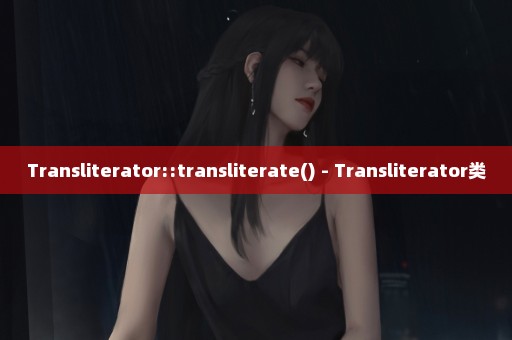Transliterator::transliterate() - Transliterator类
Transliterator::transliterate()
(PHP 5 >= 5.4.0, PHP 7, PECL intl >= 2.0.0)
Transliterate a string
说明
面向对象风格publicTransliterator::transliterate(string $subject[,int $start[,int $end]]): string过程化风格
transliterator_transliterate(mixed $transliterator,string $subject[,int $start[,int $end]])
Transforms a string or part thereof using an ICU transliterator.
参数
$transliteratorIn the procedural version, either a Transliterator or a string from which a Transliterator can be built.
$subjectThe string to be transformed.
$startThe start index(in UTF-16 code units)from which the string will start to be transformed, inclusive. Indexing starts at 0. The text before will be left as is.
$endThe end index(in UTF-16 code units)until which the string will be transformed, exclusive. Indexing starts at 0. The text after will be left as is.
返回值
The transfomed string on success,或者在失败时返回FALSE.
范例
Converting escaped UTF-16 code units

以上例程的输出类似于:
お早うございます 1 \uD834\uDD1E 𝄞
参见
- Transliterator::getErrorMessage() Get last error message
- Transliterator::__construct() Private constructor to deny instantiation
I pretty much like the idea of hdogan, but there's at least one group of characters he's missing: ligature characters. They're at least used in Norwegian and I read something about French, too ... Some are just used for styling (f.e. fi) Here's an example that supports all characters (should at least, according to the documentation): In this example any character will firstly be converted to a latin character. If that's finished, replace all latin characters by their ASCII replacement.
Sorry, for posting it again, but I found a bug in my code:
If you have a character, like the cyrillic ь (a soft-sign - no sound), the "Any-Latin" would translate it to a prime-character, and the "Latin-ASCII" doesn't touch prime-characters. Therefore I added an option to remove all characters, that are higher than \u0100.
Here's my new code, including an example:
var_dump(transliterator_transliterate('Any-Latin; Latin-ASCII; [\u0100-\u7fff] remove',
"A æ Übérmensch på høyeste nivå! И я люблю PHP! есть. fi"));
// string(50) "A ae Ubermensch pa hoyeste niva! I a lublu PHP! est. fi"
Another approach, I found quite helpful (if you by no way want to remove characters ...), try to use iconv() in addition. This surely will just return ASCII characters.
See: http://stackoverflow.com/a/3542748/517914
Also an example here:
var_dump(iconv("UTF-8", "ASCII//TRANSLIT//IGNORE", transliterator_transliterate('Any-Latin; Latin-ASCII',
"A æ Übérmensch på høyeste nivå! И я люблю PHP! есть. fi"));
// string(50) "A ae Ubermensch pa hoyeste niva! I a lublu PHP! est'. fi"You can create slugs easily with:
OOP version :
There are some possibly undesirable conversions with ASCII//TRANSLIT//IGNORE or your users may require some custom stuff.
You might want to run a substitution up front for certain things, such as when you want 3 letter ISO codes to replace currency symbols. £ transliterates to "lb", for example, which is incorrect since it's a currency symbol, not a weight symbol (#).
ASCII//TRANSLIT//IGNORE does a great job within the realm of possibility :-)
When it doesn't do something you want it to, you can set up a CSV with one replacement per line and run a function like:
function stripByMap($inputString, $mapFile)
{
$csv = file($mapFile);
foreach($csv as $line)
{
$arrLine = explode(',', trim($line));
$inputString = str_replace($arrLine[0],$arrLine[1],$inputString);
}
return $inputString;
}
or you can write some regexes. Transliterating using ASCII//TRANSLIT//IGNORE works so well that your map probably won't be very long...鹏仔微信 15129739599 鹏仔QQ344225443 鹏仔前端 pjxi.com 共享博客 sharedbk.com
图片声明:本站部分配图来自网络。本站只作为美观性配图使用,无任何非法侵犯第三方意图,一切解释权归图片著作权方,本站不承担任何责任。如有恶意碰瓷者,必当奉陪到底严惩不贷!
 百科狗
百科狗



